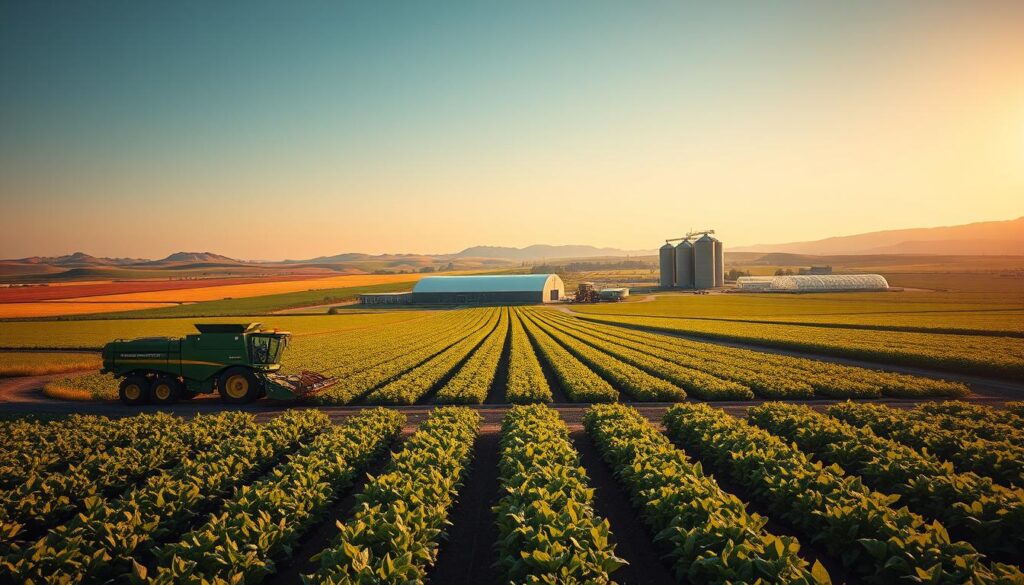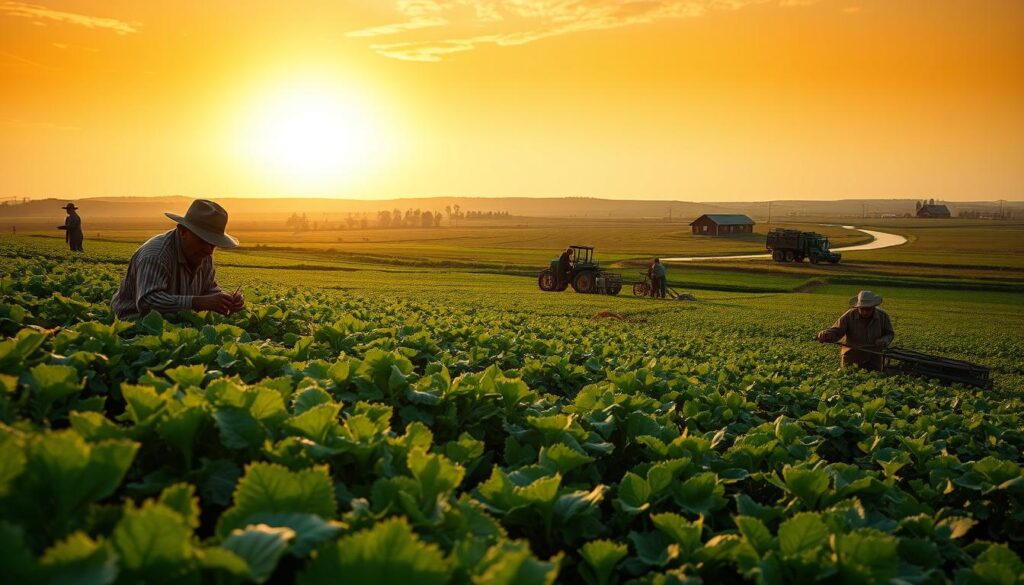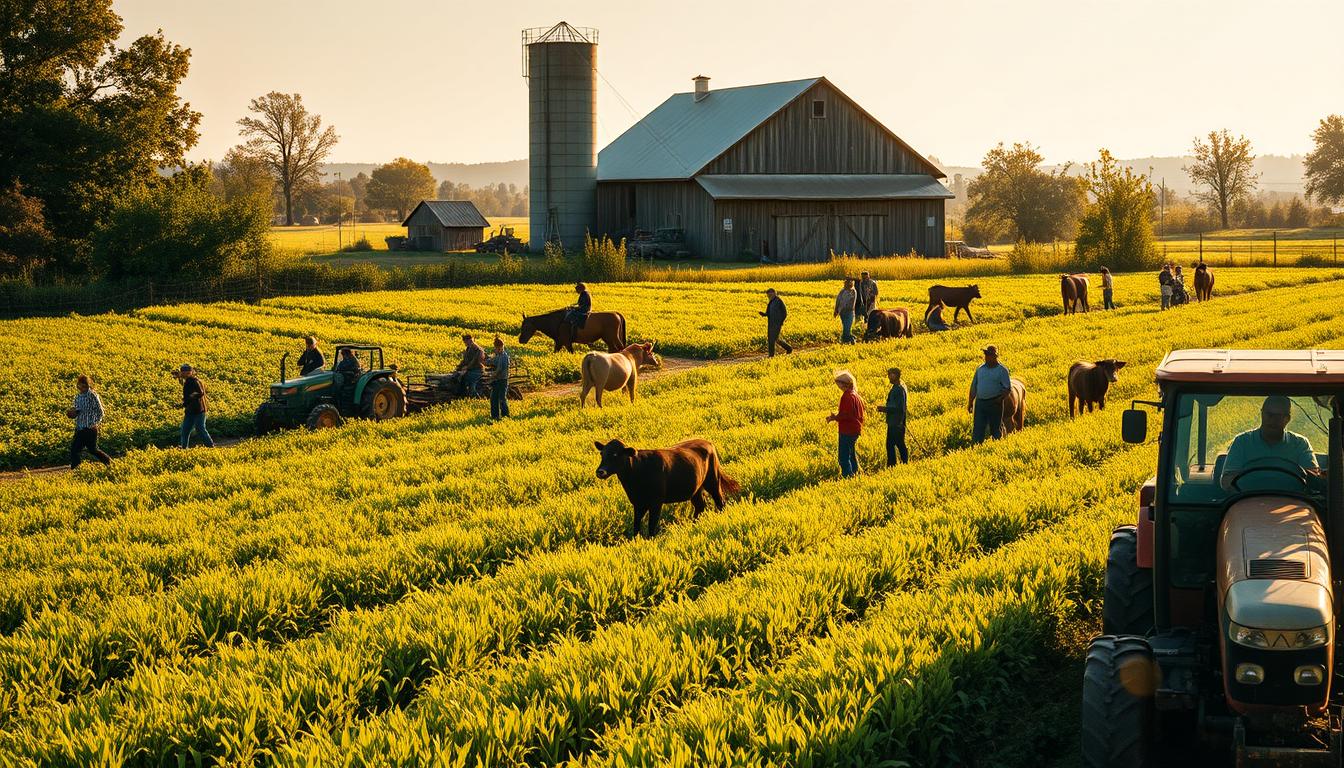What if your dream job in agriculture isn’t about just working the land, but mastering the business behind it? With U.S. farms generating over $549.8 billion annually, the industry offers far more than traditional roles. Modern farming demands candidates who blend hands-on expertise with strategic thinking—and employers are actively seeking them.
The average farm now earns around $275,000 yearly, creating diverse openings in crop science, equipment tech, and sustainable practices. However, landing these roles requires more than grit. You’ll need a polished farm worker resume that highlights both field experience and business savvy. Tools like RoboApply’s AI platform simplify this process, optimizing applications for today’s competitive market.
USDA programs now offer loans and training for newcomers, making 2025 an ideal time to enter the field. Whether you’re targeting livestock management or agritourism, employers prioritize candidates who understand financial planning and tech integration. This guide will show you how to stand out—from tailoring your skills to acing farm-specific interviews.
Key Takeaways
- U.S. agriculture generates $549.8 billion annually, with average farms earning $275,000—creating high-demand roles beyond traditional fieldwork
- Modern resumes must balance technical farming skills with business acumen, as shown in specialized farm worker resume examples
- AI tools like RoboApply streamline applications by optimizing for keywords and employer preferences
- USDA support programs provide critical resources for new entrants, including loans and disaster relief
- Success requires understanding seasonal hiring patterns and demonstrating adaptability to tech-driven farming practices
Introduction: Embracing Farming Opportunities in 2025
The agricultural sector now combines centuries-old practices with cutting-edge innovation. With average farm revenues reaching $275,000 annually, this market rewards professionals who adapt to its evolving demands. Your path here might involve managing vertical farms or optimizing crop yields through biotech agriculture innovations.
Agricultural Industry Outlook
USDA-backed programs create stability for new entrants through low-interest loans and disaster relief. Over 40% of farms now use precision agriculture tools, boosting efficiency and creating tech-focused roles. This shift means your skills in data analysis or equipment maintenance could prove vital.
What Modern Farming Careers Offer
Today’s opportunities span organic crop specialists, agritourism coordinators, and drone operators. Compensation packages increasingly include profit-sharing models, with top managers earning six-figure incomes. Regional variations let you choose between California’s vineyards or Midwest grain operations.
Demand grows for professionals who bridge traditional knowledge and digital tools. Platforms like specialized resume examples help showcase this hybrid expertise. Whether you prefer hands-on work or strategic planning, 2025’s farms need diverse talent to thrive.
Understanding the Modern Farm Job Landscape
Agriculture’s evolution demands professionals fluent in both soil science and spreadsheets. Employers now prioritize candidates who grasp operations management as thoroughly as irrigation systems. You’ll find roles expanding beyond fieldwork into data-driven decision-making and supply chain optimization.

Industry Trends and Opportunities
Drought-resistant crop specialists and automated equipment technicians rank among 2025’s fastest-growing positions. The average farm dedicates 18% of its budget to technology upgrades, creating demand for workers skilled in GPS-guided planting and yield analysis software. Small-scale organic farmers report 22% higher profit margins when combining traditional methods with e-commerce sales strategies.
Physical stamina remains non-negotiable—72% of employers require lifting 50+ pounds daily. However, tools like specialized resume examples help demonstrate your adaptability to both manual labor and financial planning tasks. Vertical farm managers in urban areas now earn $68,000 annually, proving tech integration creates lucrative pathways.
Key Challenges for New Farmers
Startup costs shock many entrants: $15,000 buys basic equipment for a 5-acre vegetable plot, while dairy operations demand $1.2 million+ investments. Unpredictable weather patterns force 63% of farms to revise planting schedules annually. You’ll need risk mitigation strategies like diversified crops or livestock insurance to stabilize income.
Market volatility adds complexity—corn prices fluctuated 40% in 2023 alone. Successful candidates discuss contingency plans during interviews, showing awareness of commodity trading and emergency funding sources. Mentorship programs bridge experience gaps, with 89% of new hires reporting faster skill development through hands-on training.
Essential Resume Tips: How to Land a Farmer Job in 2025
Employers scan applications in 8 seconds—make yours count. Start with quantifiable achievements like “Boosted corn yield by 18% through soil analysis” instead of vague statements. Use action verbs like managed, optimized, or implemented to showcase hands-on farm expertise.
Smart Tools for Precision Applications
RoboApply’s AI Resume Builder identifies keywords from 2,000+ farm job postings. It tailors your agricultural resume examples to highlight equipment maintenance or crop rotation knowledge. The system even suggests seasonal availability phrasing like “Available May-October for full-season work commitments.”
Cover Letters That Harvest Attention
Address the hiring manager by name and connect your experience to their specific operations. For dairy roles, mention herd health protocols. In crop production, discuss irrigation system upgrades. RoboApply’s template library includes phrases like:
- “Reduced feed costs 12% through grazing rotation plans”
- “Trained 4 seasonal workers in combine operation safety”
Link your knowledge to employer pain points. If applying through platforms like specialized job boards, mirror their terminology about equipment certifications or organic pest management. Finish with availability dates—73% of managers prioritize candidates specifying seasonal readiness.
Building a Skill Set Tailored for Farming Roles
Are you ready to develop the exact abilities modern agricultural employers demand? Today’s roles require mastery in three areas: technical execution, animal stewardship, and team coordination. Let’s break down the skills that turn applicants into top candidates.

Technical Skills and On-Field Expertise
Equipment proficiency separates casual workers from career professionals. Master tractor calibration, irrigation system troubleshooting, and combine harvester maintenance. For crop specialists, demonstrate precise transplanting techniques that reduce plant shock or soil testing methods that boost yields.
Livestock roles demand vaccination schedules and breeding cycle management. One dairy farm manager notes: “Candidates who track milk production metrics while maintaining animal comfort get hired first.”
Soft Skills and Leadership Qualities
Successful teams rely on clear communication during planting deadlines and harvest crunches. Practice explaining complex tasks like crop rotation plans to diverse crews. Use conflict resolution strategies when weather disruptions stress workflows.
- Coordinate 5+ workers during time-sensitive operations
- Train newcomers on equipment safety protocols
- Adapt planting schedules for unexpected frosts
Strengthen your research skills to analyze soil reports or market trends. Combine technical know-how with business insight to become indispensable. Tomorrow’s agricultural leaders balance field expertise with strategic thinking—exactly what employers seek.
Navigating Interview Preparation and Strategy
Agricultural employers assess your readiness through targeted questions that reveal both physical endurance and operational awareness. Successful candidates anticipate these inquiries while demonstrating adaptability to unpredictable farm environments.
Common Farming Interview Questions
Expect direct queries about daily demands. One Midwest grain farm manager states: “We prioritize applicants who describe specific instances of working 12-hour shifts during harvest.” Prepare responses like:
- “I maintained irrigation systems during 100°F heatwaves by starting tasks at dawn”
- “Managed 3,000-pound hay bales using proper lifting techniques to prevent injury”
Seasonal commitment remains critical. Highlight availability windows: “I blocked off May-October for full-time work to support planting through harvest.”
Showcasing Your Practical Experience
Use the STAR method (Situation-Task-Action-Result) when discussing operations. For example:
- “Noticed uneven crop growth in Section 5B”
- “Tested soil pH and adjusted fertilizer ratios”
- “Increased yield by 14% within one growing cycle”
Demonstrate business acumen by mentioning cost-saving measures or customer interactions. Those applying for leadership roles should reference operations manager resume strategies that balance technical skills with team coordination.
Practice explaining equipment repairs or weather-related pivots. One organic vegetable farmer recalls: “A candidate who described rebuilding a broken tractor clutch mid-harvest got hired on the spot.”
Leveraging RoboApply Tools for Job Search Success
Modern agricultural roles require tech-savvy approaches to stand out. RoboApply’s specialized tools bridge the gap between traditional farming skills and digital hiring demands, giving you an edge in this competitive market.
Precision Application Crafting
The ATS Optimizer scans 2,000+ agricultural job posts to identify keywords like “crop rotation planning” or “livestock health monitoring.” It ensures your resume speaks the language of farm hiring managers. Pair this with the Grammar Checker to eliminate errors that might suggest carelessness in meticulous field operations.
Strategic Employer Engagement
RoboApply’s Interview Coach prepares you for questions like “Describe handling equipment failures during harvest.” Practice responses using real-world scenarios from remote tech worker strategies, adapted for agricultural contexts.
The Outreach CRM tracks every interaction with potential employers. Set reminders to follow up with dairy farm managers after planting season or send updated availability to organic produce operations. This data-driven approach keeps your search organized and proactive.
These tools help transform generic applications into targeted solutions for specific opportunities. By aligning your materials with employer needs and industry trends, you position yourself as a candidate who understands modern agriculture’s blend of tradition and innovation.
FAQ
What qualifications do I need for farm work in 2025?
Employers prioritize hands-on experience with livestock care, crop management, or equipment operation. Formal education in agricultural science or USDA-certified programs strengthens applications. Highlight certifications like Pesticide Applicator licenses or Farm Business Management training.
How can I showcase sustainable farming practices on my resume?
Detail specific techniques like precision agriculture, soil health monitoring, or integrated pest management. Mention tools you’ve used (drones, GPS-guided tractors) and quantify results – e.g., “Reduced water usage by 18% using smart irrigation systems.”
What interview questions should I prepare for farm manager roles?
Expect scenario-based questions like “How would you handle a sudden crop disease outbreak?” or “Describe your approach to equipment maintenance schedules.” Use the STAR method (Situation, Task, Action, Result) to structure responses with measurable outcomes.
How does RoboApply’s ATS Optimizer improve my chances?
The tool scans job descriptions for keywords like “organic certification” or “herd health management” and aligns your resume with employer priorities. It ensures compliance with applicant tracking systems used by 98% of large-scale farm operations.
What soft skills matter most for modern farming careers?
Demonstrate crisis management during extreme weather events, team coordination during harvest seasons, and adaptability to new technologies. Employers value problem-solving in supply chain disruptions and communication with agricultural extension services.
How do I address lack of formal farming experience?
Highlight transferable skills from related work – equipment repair, data analysis for crop yields, or volunteer work with community-supported agriculture (CSA) programs. Use RoboApply’s Cover Letter Builder to connect these experiences to specific job requirements.
What financial planning resources help new farmers?
Explore FSA (Farm Service Agency) loans, USDA Beginning Farmer grants, and state-level tax incentives for sustainable practices. Include budget management software proficiency (QuickBooks Agricultural Edition) in your technical skills section.


















